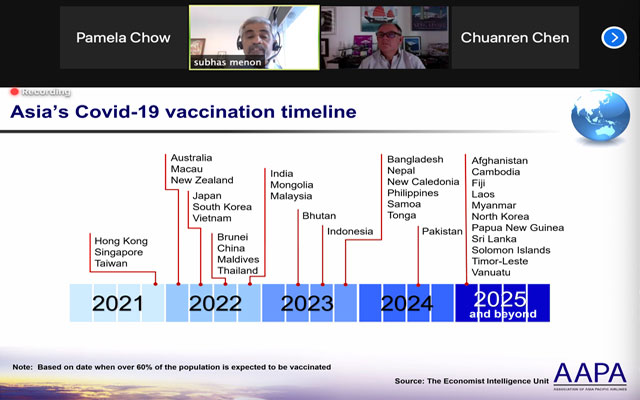As the Covid-19 vaccine rollout promises a glimpse of travel rebound, the Association of Asia Pacific Airlines (AAPA) warns that global economic recovery may likely be hampered by inequality of immunisation in developing countries.
Its director-general, Subhas Menon, cautioned: “Everyone is pinning their hopes on the vaccine and mass immunisation. No one is safe until everyone is safe. Unfortunately, this is not the approach taken by many. It seems like – with regard to immunisation – while the developed world will be done and dusted by the end of the year, the developing and emerging world is on a very long and slow road to achieving the same result. Even large economies that have vaccine production like India, China and Russia are struggling to remain on the chart (of mass immunisation).”

Data from the Economist Intelligence Unit predicts that the first countries in Asia-Pacific to have vaccinated 60 per cent of their populations by end-2021 are Hong Kong, Singapore and Taiwan. Australia, New Zealand, Japan, South Korea, Vietnam, Brunei, Thailand, India, Malaysia and China are expected to follow in 2022; with Bhutan, Indonesia, Bangladesh, the Philippines and Pakistan potentially achieving the milestone in 2023-2024.
Countries such as Afghanistan, Cambodia, Laos, Myanmar and Sri Lanka may only reach the target in 2025 and beyond. Menon observed: “(These) tourism-dependent countries are all very far down the road to mass immunisation. WHO has recognised the situation and is raising its voice for something to be done about this, but we need the whole world to go back to the basics of interconnectivity and globalisation to find a way forward.
“Economic recovery cannot just hinge on the recovery of the developed world, nor can air travel recovery just proceed with travel (within) the developed world.”
He also clarified that while vaccination has not been proven to stem the infectiousness of Covid-19, mass immunisation can give a destination the ability to safely receive travellers, regardless if they have been inoculated. This would afford a country the flexibility to reject the “no jab, no fly” stance.
As the industry looks towards taking flight once again, AAPA is pumping research into an integrated smart app that will provide travel identification, health status authentication, border control authorisation and other information for travellers of the future. This “Travel Pass” may also provide access to testing centres as well as necessary certifications.
It joins a brimming roster of other smart solutions in the making, such as IATA’s Digital Health App and SITA’s Automatic Border Control, spotlighting the need for these systems to undergo tight audits and standardisation before market launch.
“A very important aspect of the travel pass is the standardisation of the format for (immunity) certification, as well as authentication and audit of test certificates and testing centres. We would need (the involvement of) WHO and ICAO – who are working on this as we speak – and a multilateral agreement will be required for governments to sign. This will be a necessary condition for any travel pass,” asserted Menon.




















